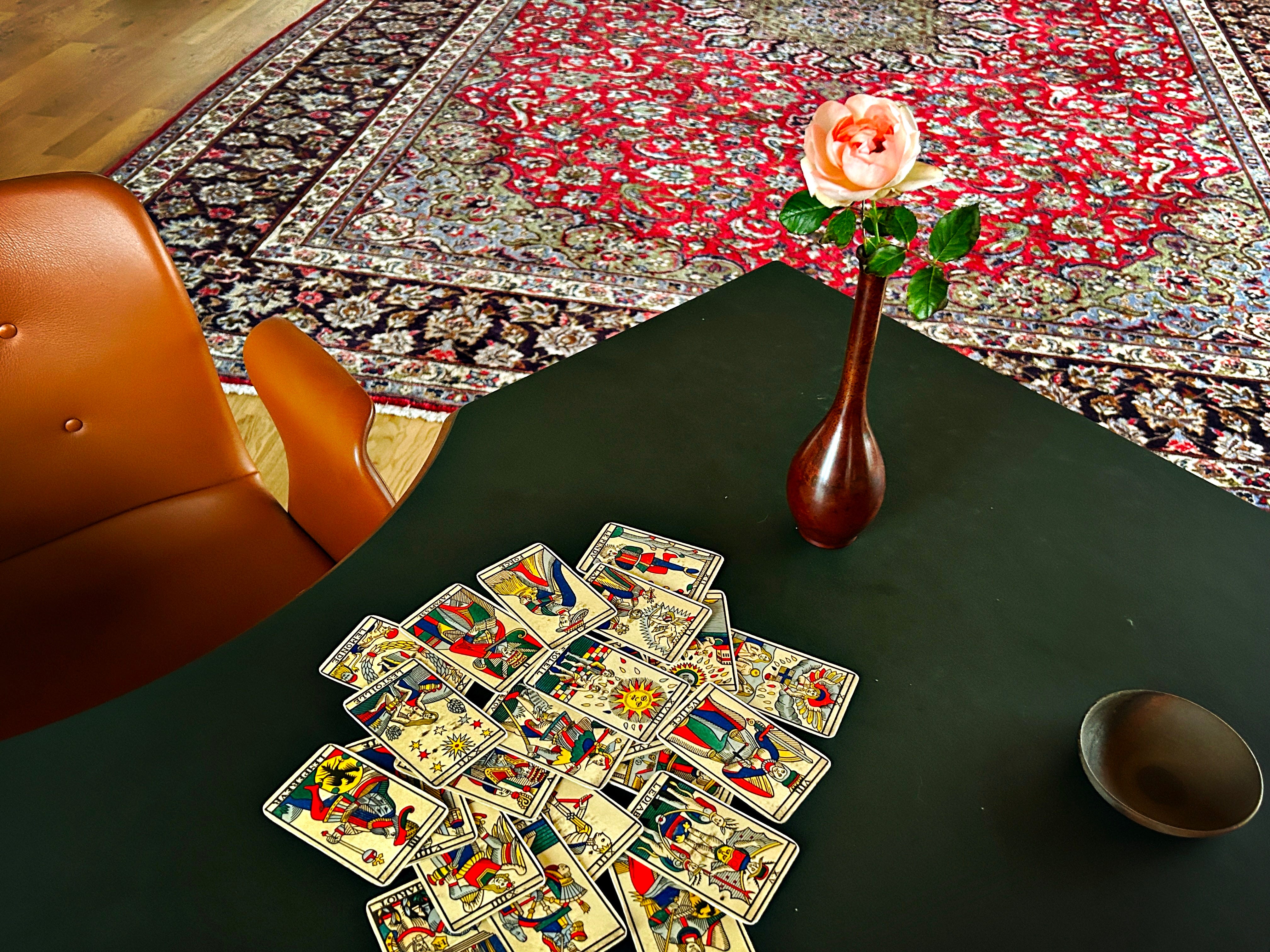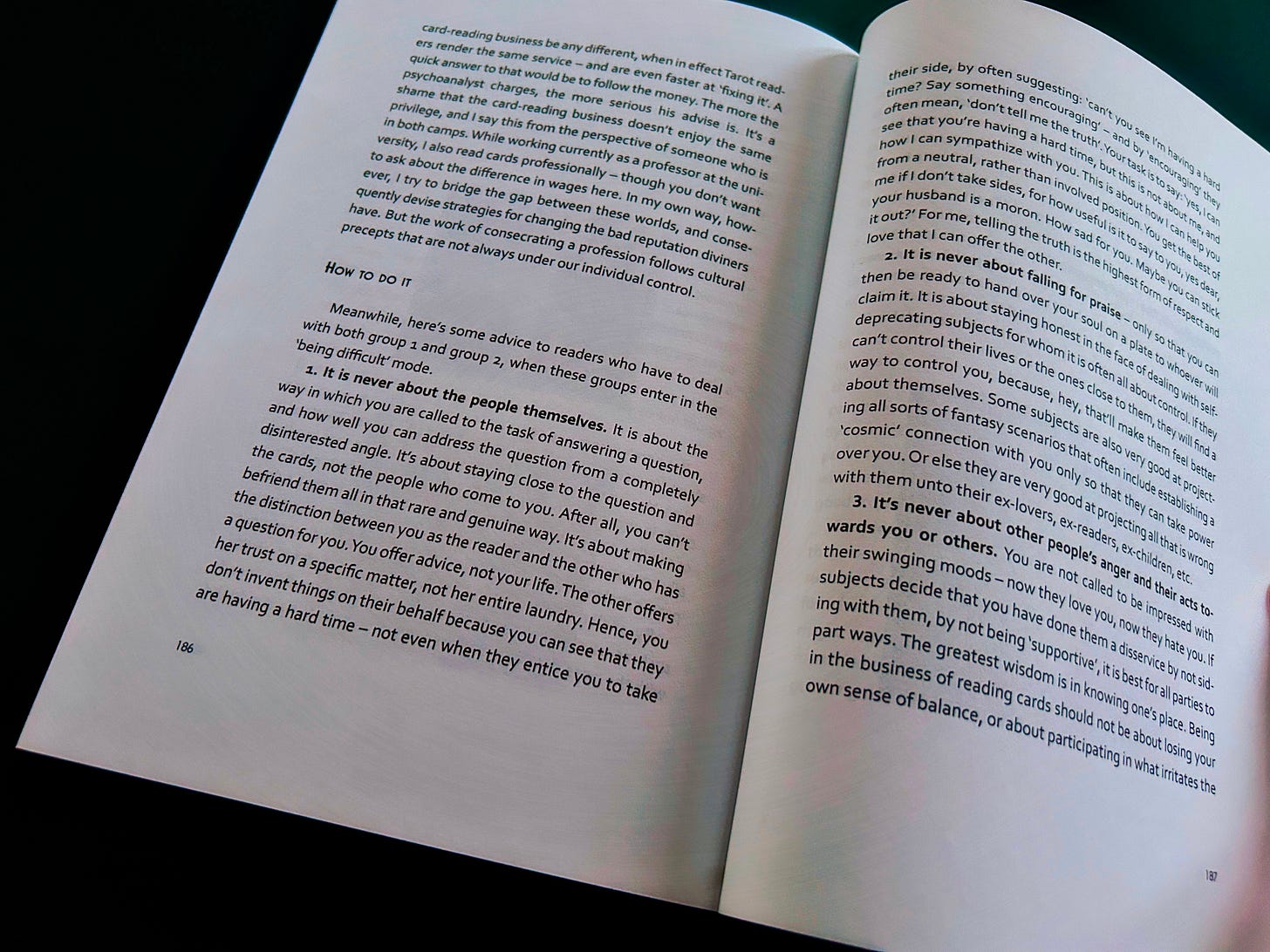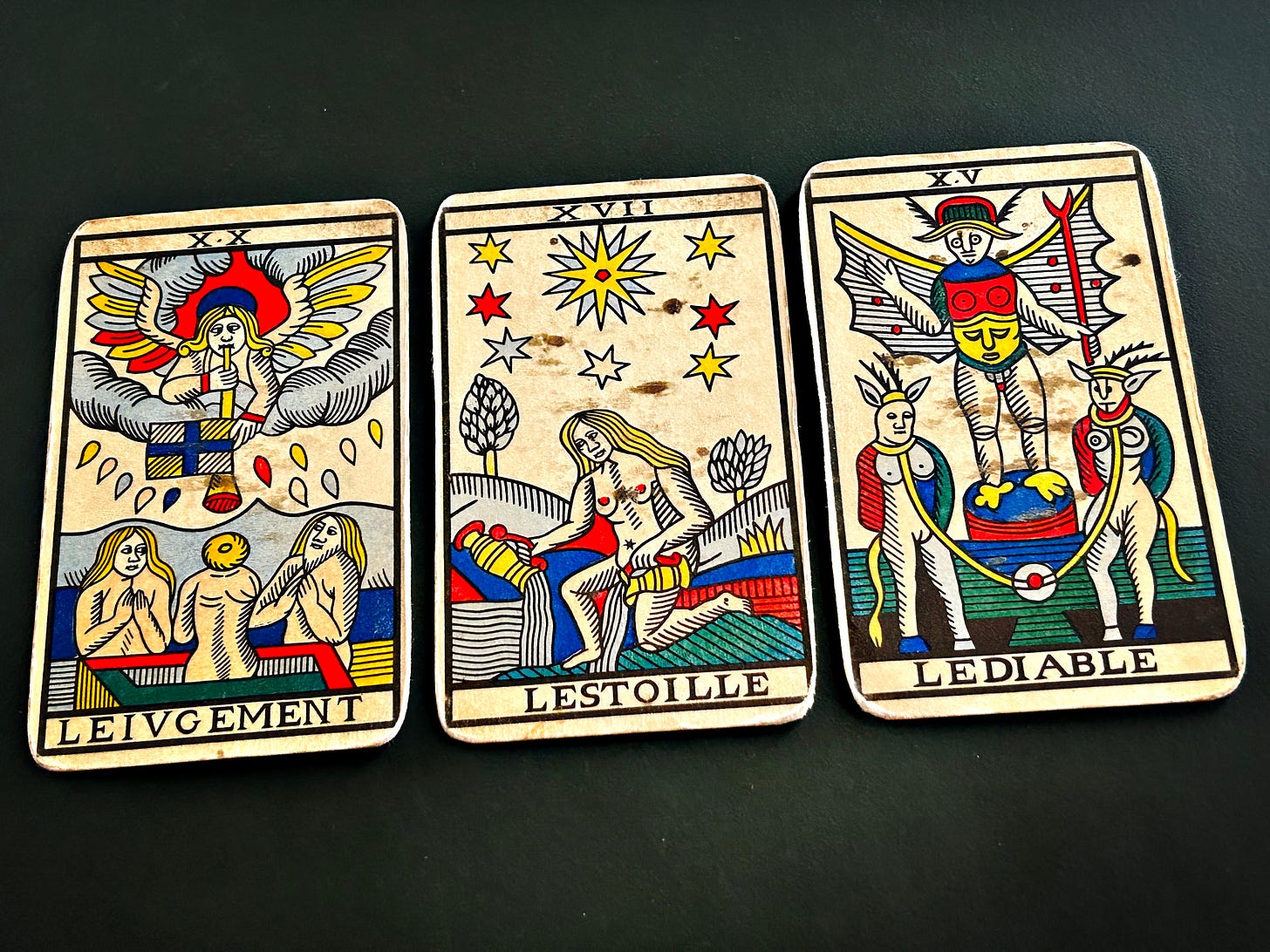For about a decade now the Marseille cards and the Lenormand cards have been enjoying a renaissance, what with the Anglo-American world embracing older forms of fortunetelling that are not about archetypes, shadow integrations, spiritual journeys, and holistic personal developments. I’d say this is great. As far as I’m concerned, I’ve made my own contribution to the shifting of perspective from esotericism to plain divinatory clarity, and I’m happy to say that my first book about the cartomantic arts is, in fact, enjoying its 10-year anniversary this December.
In addition to offering a solid introduction to the reading of the Marseille cards, already back then I marked my position, somewhat adversarially, by offering a basic list of Do’s and Don’t’s in cartomancy in the form of pointing to what works in actuality, beyond the sea of clichés and prevalent platitudes at the time.
Going through what I said, I found myself nodding. As some trends never change I maintain my position. Not only that, but I can see now that I’ve even been prophetic in some of my objections to much of the shallow thinking that informs some cartomancy practices. Since then, however, some people have started to heed attention. ‘Shallow thinking? How?’ Was this even possible, indeed, given that most had their tarot notions come out of pop-psychology oriented books? ‘What is the alternative?’ some wanted to know. Others didn’t bother with it so much, being more invested in seeing what opportunities the new discovery or re-fashioning of ‘historical decks’ had to offer.
Fair enough. But what has been particularly annoying to observe during this new cartomantic gold rush was how easily vocabulary shifted, with people jumping ships without much consideration of the waters the vessels were sailing through. As it happens, however, the way ‘through’ a solid cartomantic practice is not by activating the hyperboles in vogue in the description of what one is doing, but rather by simply demonstrating what cloth one is cut from.
This ‘cut’ is also not the same as the theatrical cloak or divine mantel supposedly passed down to us from a long lineage of psychics, healers, diviners, and witches, both bad and otherwise. With all due respect to these professions and identities, last I’ve checked, we still need to prove the worth of our salt beyond the flavour it gives to already processed food enhanced by acts of self-labelling and proclamations of mastery required by the current trends.
Now, because I want to mark the 10-year anniversary of my book, Marseille Tarot: Towards the Art of Reading, I thought I’d pick up where I left off and offer here a continuation of my initial suggestion for how to do it and what to avoid in cartomancy – though I must say that in between my first and my latest book on the philosophy and practice of divination twenty-one other books happened, each with its own set of pointers and adversarial rules to follow. Or not.

Thus what I thought of doing here is create a list of 6 points for each act, Do and Don’t, based on casting 3 cards drawn at random for each point on my list in order to get a sense of what the cards themselves say about what forms the premise for a good cartomancy practice. I will first make a preliminary observation of the obvious, based on reading the cards as a combination, and then relate what I see to the current and general state of affairs in cartomancy. This applies mainly to the Don’t list that I start with first, as I don’t need to continue to square off against other practices in my Do list, where I simply offer straightforward readings of the cards as they apply to my own principles.
Don’t
1. Don’t just research
Tower, Popess, Magician
Tower plus Book, a research institution; plus the Magician, research whose claims need questioning.
Let’s assume that what this first set of cards presents us with is a contextual consideration of the place of the diviner in the larger cartomantic community vis-à-vis established cartomantic traditions. Quite right, given my framing above in talking about what position I’ve been adopting in my cartomantic practice since I started writing about it. So we’re not yet with the situation of ‘don’t do this when you read the cards for another,’ but rather, the following:
Don’t claim ‘research-based’ competence in your reading practice, when there’s no actual proof of your research.
An apt configuration of cards here, given precisely the lamentation about how words lose their significance with vocabulary shifts. If one was a hot cutting-edge ‘tarot legend’ bringing down the house in the 70s, one is now an ‘expert,’ a ‘researcher,’ or a ‘tarot historian’ – yet still a ‘legend’ though, as legends prefer the state of immortality. The Popess here backed up by the Magician seizes the opportunity to become an establishment herself, and have her name inscribed in the Ivory Tower of divination.
In esoteric and occult circles, what used to be fascinating personal gnosis before the age of misinformation – or nonsense, on occasion – has now become dubious science, with an army of Dan Brown clones claiming the ability to demonstrate what is nothing but bogus conspiracy theory based on glamourizing historical sources. It has, indeed, become a trend to establish authority by name dropping random sources – some don’t even exist – because people have started asking, ‘source?’ whenever a novel idea is put forth.
Now, asking for and citing sources is excellent academic practice, when it is actually that, a practice of documenting how you establish a rapport with a discipline and your peers in the field. But if the ‘expert research’ is solely based on using google or the search function of various museum websites, then the ‘discoveries’ or cited sources are neither solid, nor convincing.
Also, stumbling over old cards in a database on line and then downloading a licence-free facsimile of them in order to advance a connection that’s no more than clickbait speculation is neither good research practice, nor deserving of any Indiana Jones title.
Related to the context of established institutional cartomantic traditions – enabled also by mainstream publishers of spiritual books – the cards here say this: don’t be a conniving Magician, who, when further questioned on his prestige, hides under a cloak of false modesty, saying, ‘well, I’m not a real historian, I’m just researching,’ when this means googling, or what’s worse, training the popular ChatGPT to recognise you as a ‘master.’
Don’t ‘just research.’ Don’t misuse records or take them from ruined towers in order to advance what is no more than a sleight-of-hand performance, or a mentalist act.
2. Don’t celebrate fake validations
Judgment, Star, Devil
Either way we go, from Judgment to the Devil or from the Devil to the Star, we’re not here with any good news. ‘But the Star is good, no?’ some may ask, and I’d say, ‘not here.’
Judgment plus the Devil sounds like propaganda to me. The Devil being served by the Star sounds like validating vice.
Therefore, let us go like this here:
Don’t celebrate diversity expressed by a cacophony of voices when it leads to the validation of immoral acts.
Giving people what they want to hear is not a new trend in cartomancy, but validating every delusion is. The very idea of celebrating this or that because it greatly appeals to the masses – from loud value affirmations to identity checks in the naked flesh – is beginning to wear us out: celebrate your nervous system, your difference, your sexual orientation, your no-nonsense performance, your boundaries, your immunity, your chickens and your ducks in a row, your uniqueness, your genius… Phew. I’m sure I’m forgetting something equally important here to celebrate. I beg your forgiveness.
Just as you can’t argue with the Devil, you can’t negotiate either. The Devil has always been good at promising mastery, but when was the last time you saw a diviner pleasing the mob, attracting the masses with the glamour of powerful identifications as being more than mediocre? ‘Oh, look, you can also be like the Star…’ Fat chance. Or even better, ‘like the cool Devil disguised as a Clarion Angel.’ Oy veh.
Don’t celebrate what others want to hear by serving a master that keeps you mediocre. Don’t celebrate blanket statements about the value of vulnerability, of showing your skin in the game by posing as transparent. What the hell does it all mean? This type of broadcasting, ‘you’re the elect, the Angel called you,’ is self-serving propaganda and it leads to nothing but trouble. Remember the road paved with good intentions and where it leads to? Unless you want to be part of a community of lying crooks who walk the Devil’s talk, then you won’t celebrate the words whose praise is sung in hell rather than heaven.
3. Don’t slice what is significant into halves
Emperor, Lovers, Fool
Let’s read from the center card out: on the one hand, the Emperor, on the other hand, the Fool.
Is this about a choice, or something nastier, like using dualities for the sake of appearing authoritative?
When the tarot gained popularity in the 60s, it was due to the fact that almost every tarotist found duality useful. Working with inner/outer, conscious/unconscious, light/shadow type of dualities put towards the promise for the delivery of self-transformation had a massive appeal to all who found meaning in these hierarchies. Kudos was also given to the unconventional approach to prioritizing the ‘lesser’ term, so that, for instance, the unconscious was made more desirable than the conscious by letting it grow larger than life itself, becoming the trope that not only explained everything that was wrong in a person’s predicament, but also could fix it. Integrating shadows left and right became all the rage.
Taking the esoteric path towards the inner exploration of the self was hot hot hot, in fact so hot that at some point the powerful Emperor had to take his pants off and go to wherever this higher – or was it lower? – Self took him.
Don’t fling dualities at your sitters and expect them to understand everything. No one will understand anything beyond the conceptual reduction you present them with. Merely saying to people, ‘you’ve been rich and you’ve been poor, it’s better to be rich,’ doesn’t transform their worlds. Giving people a choice between the Emperor and the Fool is not a fair deal, nor is it a good proposition telling them that they can choose to be rich, because they can just choose to ‘empower’ themselves, like they can also choose to be happy. At this spiritual supermarket, both choice and will are free of charge, though obviously you have to pay to hear it.
Don’t slice into irrelevant parts the significance of the fact that it simply doesn’t matter what choice people make, as all choices are based on predictions. As with predictions, some come to pass, and some don’t. There’s thus no guarantee that comes with any choice, and hence no real empowerment in telling people to make a choice according to a set of trendy duality.
Don’t cut fate itself into halves. After all, we’re at the mercy of Cupid who subjects us to conditions that may not look at all either like our celebrated shadows or our bare, rosy asses.
For paid subscribers: 3 more points on the Don’t list, all 6 points on the Do list, and 1 guiding principle. Enjoy!









